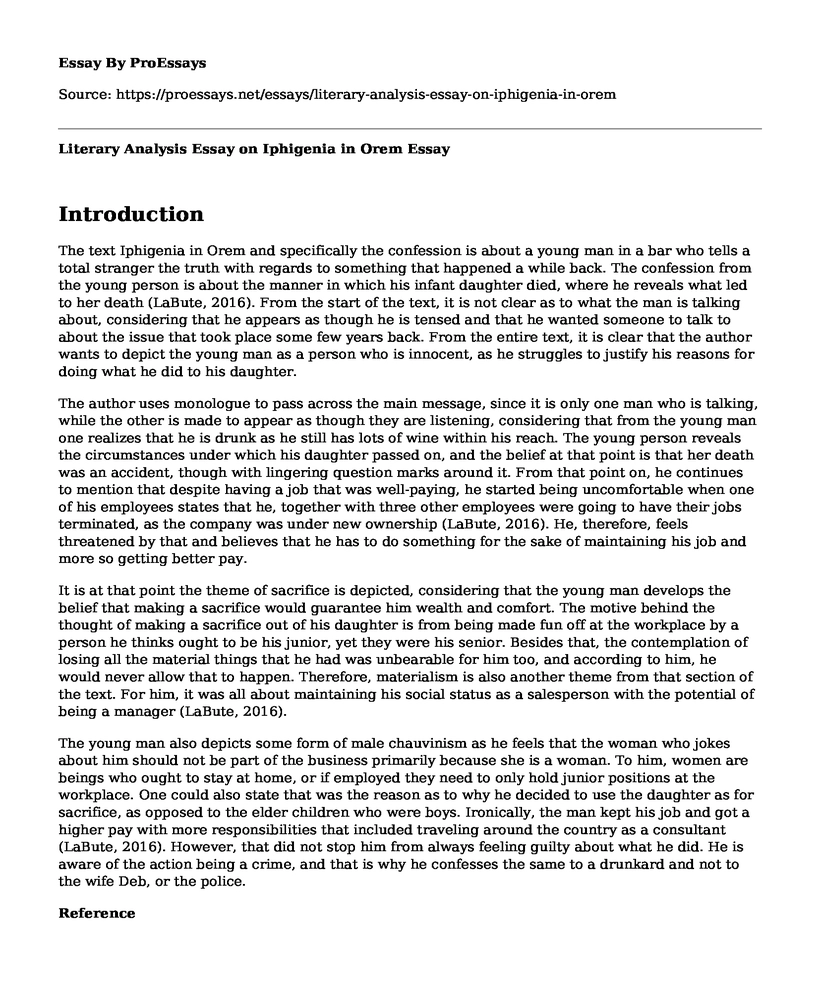Introduction
The text Iphigenia in Orem and specifically the confession is about a young man in a bar who tells a total stranger the truth with regards to something that happened a while back. The confession from the young person is about the manner in which his infant daughter died, where he reveals what led to her death (LaBute, 2016). From the start of the text, it is not clear as to what the man is talking about, considering that he appears as though he is tensed and that he wanted someone to talk to about the issue that took place some few years back. From the entire text, it is clear that the author wants to depict the young man as a person who is innocent, as he struggles to justify his reasons for doing what he did to his daughter.
The author uses monologue to pass across the main message, since it is only one man who is talking, while the other is made to appear as though they are listening, considering that from the young man one realizes that he is drunk as he still has lots of wine within his reach. The young person reveals the circumstances under which his daughter passed on, and the belief at that point is that her death was an accident, though with lingering question marks around it. From that point on, he continues to mention that despite having a job that was well-paying, he started being uncomfortable when one of his employees states that he, together with three other employees were going to have their jobs terminated, as the company was under new ownership (LaBute, 2016). He, therefore, feels threatened by that and believes that he has to do something for the sake of maintaining his job and more so getting better pay.
It is at that point the theme of sacrifice is depicted, considering that the young man develops the belief that making a sacrifice would guarantee him wealth and comfort. The motive behind the thought of making a sacrifice out of his daughter is from being made fun off at the workplace by a person he thinks ought to be his junior, yet they were his senior. Besides that, the contemplation of losing all the material things that he had was unbearable for him too, and according to him, he would never allow that to happen. Therefore, materialism is also another theme from that section of the text. For him, it was all about maintaining his social status as a salesperson with the potential of being a manager (LaBute, 2016).
The young man also depicts some form of male chauvinism as he feels that the woman who jokes about him should not be part of the business primarily because she is a woman. To him, women are beings who ought to stay at home, or if employed they need to only hold junior positions at the workplace. One could also state that was the reason as to why he decided to use the daughter as for sacrifice, as opposed to the elder children who were boys. Ironically, the man kept his job and got a higher pay with more responsibilities that included traveling around the country as a consultant (LaBute, 2016). However, that did not stop him from always feeling guilty about what he did. He is aware of the action being a crime, and that is why he confesses the same to a drunkard and not to the wife Deb, or the police.
Reference
LaBute, N. (2016). Bash (pp. 11-29). Woodstock, N.Y.: Overlook Press.
Cite this page
Literary Analysis Essay on Iphigenia in Orem. (2022, Dec 02). Retrieved from https://proessays.net/essays/literary-analysis-essay-on-iphigenia-in-orem
If you are the original author of this essay and no longer wish to have it published on the ProEssays website, please click below to request its removal:
- Speech Example on Gun Laws, Semi-Automatic Weapons, And Strict Background Checks
- Marie de France and Chivalric Romance Essay Example
- Essay on Toni Morrison's "Milkman": Exploring Collective Fictions and Heroism
- The Development of the Characters in Homer's Iliad Essay Example
- Essay Example on Percy Jackson and the Lightning Thief: Literary Analysis
- Essay Example on Top Girls & A Raisin in the Sun: Women's Place in Society
- The Lottery: Shirley Jackson's Tale - Literary Analysis Essay







